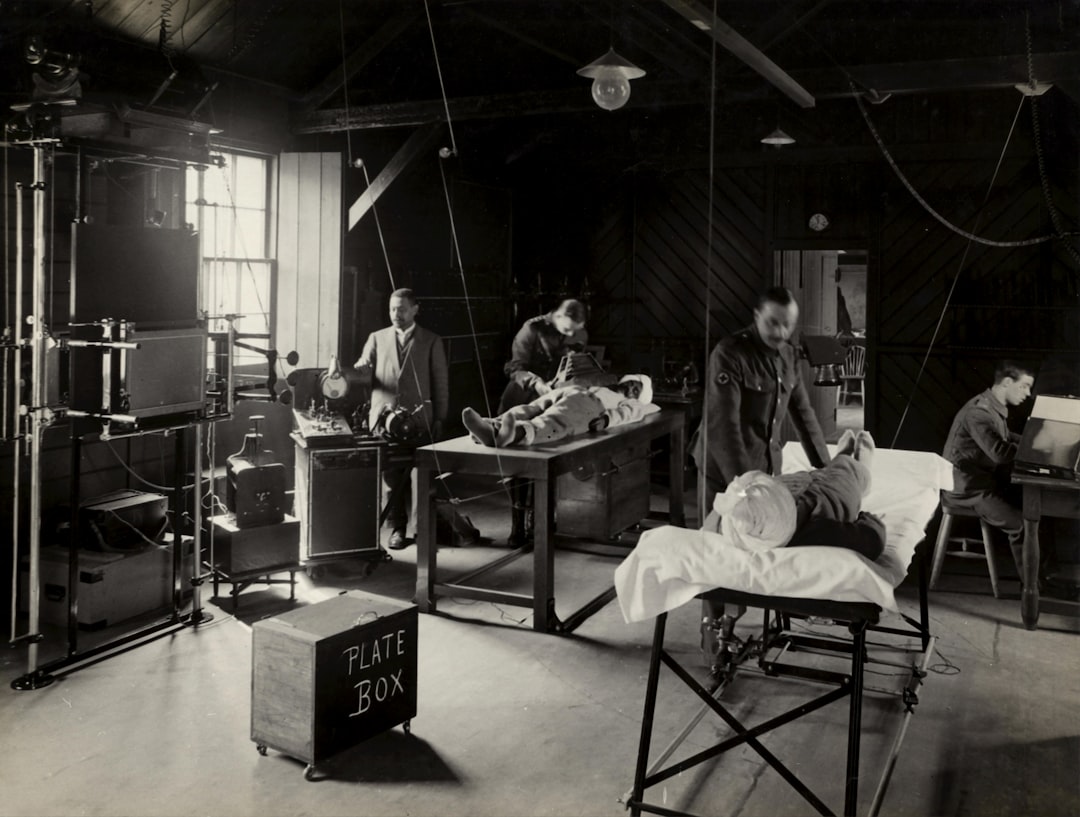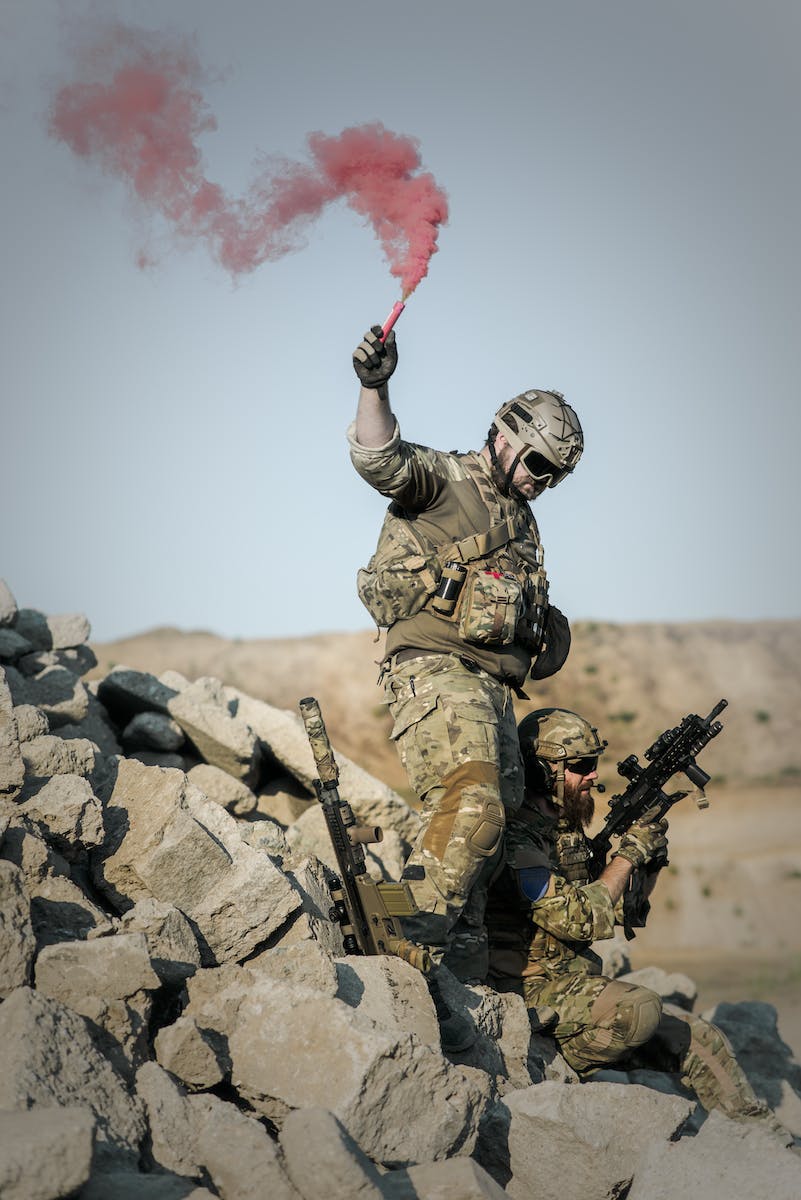The article discusses the threat of chemical weapons during the Gulf War in 1991 and explores the theory that changed wind patterns influenced Iraqs decision not to employ chemical warfare on Israel.

Photo by Taton Moïse on Unsplash | Commercial use allowed
Gulf War Background
The Gulf War of 1991, also known as Operation Desert Storm, was a pivotal conflict that arose in response to Iraq’s invasion of Kuwait and posed a direct threat to the stability of the Persian Gulf region. The United States led an international coalition to safeguard its strategic interests in the region, including the protection of vital oil resources and the deterrence of further Iraqi aggression. This military intervention was not primarily aimed at benefiting Israel, but rather to address the broader geopolitical implications of Iraq’s actions in the Middle East.
During this period, Israel found itself in a precarious position, facing the looming threat of potential attacks from Iraq, despite not being an active participant in the conflict. The country had to bolster its defenses and prepare for the possibility of chemical warfare, as Iraq’s aggressive behavior and repeated threats to use chemical weapons on Israel raised serious concerns. Consequently, Israel experienced a substantial economic burden, with heightened defense spending and significant property damage resulting from the Iraqi missile attacks during the war.
Furthermore, Israel’s provision of military intelligence, weaponry, and technological advancements to the United States underscored its commitment to supporting the coalition forces, despite not being directly involved in the combat operations. This collaborative effort demonstrated Israel’s strategic importance in the region and its willingness to contribute to the collective security objectives of the coalition, emphasizing its proactive stance in addressing regional threats.
The Gulf War had far-reaching implications for Israel, with the country facing significant costs and damages as a result of the conflict, including increased defense spending, property damage, and loss of economic productivity. Despite not being a major participant in the Gulf War, Israel’s involvement was marked by the provision of valuable assistance to the US, including military intelligence, weapons, and technological innovations. This support highlighted Israel’s commitment to regional stability and its strategic partnership with the United States during a period of heightened tensions and military operations in the Middle East.
Threat of Chemical Weapons
The threat of chemical weapons during the Gulf War had profound implications for Israel, as it posed a significant risk to the country’s security and well-being. The prospect of Iraq using chemical weapons on Israel not only raised immediate concerns but also prompted Israel to reevaluate and bolster its defense strategies against such attacks. This threat necessitated a comprehensive approach to preparedness, leading to significant investments in protective equipment, medical treatments, and early warning systems. For example, Israel’s development of protective gear and medical treatments was a direct response to the looming threat of chemical warfare, as the country sought to mitigate the potential impact of such attacks on its population and infrastructure.
Moreover, the historical context of the threat of chemical warfare against Israel dates back to the 1950s, shaping the country’s longstanding concerns and approach to addressing this specific form of warfare. For instance, the experiences and lessons learned from previous conflicts, such as the Iran-Iraq war, played a pivotal role in informing Israel’s defense strategies against chemical attacks. Israel’s proactive stance in anticipating and preparing for potential chemical warfare has been a central feature of its national security policy, underscoring the enduring impact of historical events on the country’s response strategies. As a result, the threat of chemical weapons during the Gulf War not only prompted immediate defensive measures but also reinforced Israel’s long-standing commitment to staying vigilant and prepared against such dangers.
The threat of chemical weapons during the Gulf War prompted Israel to develop a comprehensive defense strategy against potential attacks, focusing on protective equipment, medical treatments, and an early warning system for detecting chemical warfare. This proactive approach was informed by the historical context of the country’s experiences with the threat of chemical warfare, emphasizing the importance of being prepared and equipped to mitigate the potential impact of such attacks. Israel’s sustained efforts to enhance its defense capabilities against chemical weapons underscore the enduring nature of the threat and the country’s unwavering commitment to safeguarding its population and infrastructure from unconventional forms of warfare.
 Iraqi Rocket Attacks on Israel
Iraqi Rocket Attacks on Israel
The Iraqi rocket attacks on Israel during the Gulf War in 1991 had profound implications for the country. The firing of approximately 42 Scud missiles into Israeli territory posed a significant threat to the safety and security of the Israeli population. The attacks targeted densely populated cities like Tel Aviv and Haifa, causing fear and anxiety among the civilians and resulting in casualties and extensive property damage. The psychological impact of these attacks cannot be overstated, as the constant threat of missile strikes created a climate of fear and uncertainty throughout the country. The Israeli government and military were tasked with the challenging responsibility of ensuring the safety and protection of its citizens in the face of this onslaught.
Despite the widespread destruction caused by the missile attacks, one crucial detail emerged that provided some relief amidst the chaos. It was confirmed that the Iraqi missiles were equipped with conventional warheads and not chemical agents. This crucial realization significantly minimized the potential casualties in Israel. The absence of chemical warheads in the Iraqi missiles meant that the immediate physical impact of the attacks was less severe than it could have been. This revelation also allowed Israel to focus its resources on emergency response, medical treatment for the injured, and the reconstruction of damaged infrastructure, rather than dealing with the additional complexities and dangers associated with chemical contamination.
The Iraqi rocket attacks on Israel during the Gulf War not only left a lasting mark on the physical landscape of the country but also shaped the collective memory and national psyche of the Israeli people. The resilience and fortitude displayed by the citizens during this challenging period became a testament to the strength of the nation in the face of adversity.
#TheGasAttackThatNeverWas, #GulfWar, #IraqThreat, #ChemicalWeapons, #IsraelDefense, #RocketAttacks, #MysteriousWeatherPatterns, #UnexplainedPhenomenon, #USMilitaryTheory, #WeatherAnomaly, #ConflictDynamics, #ProtectiveWinds, #UnforeseenFactors, #ConflictDeterrent, #GulfWarHistory, #UnpredictableForces
The consequences of the Iraqi rocket attacks on Israel during the Gulf War extended beyond the immediate physical destruction, influencing the psychological and emotional well-being of the Israeli population. The constant threat of missile strikes and the fear of potential chemical attacks created a climate of uncertainty and anxiety, posing significant challenges for the mental resilience of the citizens. The psychological impact of the attacks underscored the enduring trauma experienced by the population, highlighting the long-term consequences of living under the shadow of potential unconventional warfare.
Impact of Wind Pattern Changes
The impact of the wind pattern changes during the Gulf War had significant implications for the potential use of chemical warfare. The abnormal shift in wind direction from Israel towards Iraq played a crucial role in preventing Iraq from employing chemical weapons on Israel. This unique meteorological phenomenon became a decisive factor in shaping the strategic decisions of Iraq during the conflict.
The altered wind patterns created a situation where any chemical attacks on Israel would have backfired on Iraq due to the wind blowing directly towards their territory. This unexpected turn of events forced Iraq to reconsider the use of chemical warfare, as it would have resulted in self-inflicted harm. This highlights the intricate relationship between environmental factors and military tactics, demonstrating the unforeseen ways in which natural phenomena can impact the outcome of warfare. The U.S. military’s theory regarding the wind pattern changes sheds light on the multifaceted nature of conflict dynamics, where environmental elements can unexpectedly influence strategic decision-making.
The wind pattern changes also serve as a compelling example of how external factors beyond traditional military capabilities can significantly alter the course of historical events. It underscores the importance of considering environmental and geographical elements in military planning and conflict resolution. This unique case from the Gulf War is a testament to the interconnectedness of various factors in shaping the decisions and outcomes of warfare, highlighting the need for a comprehensive understanding of both conventional and non-conventional influences on military operations.
The alteration in wind patterns during the Gulf War not only influenced the strategic decisions of Iraq but also demonstrated the significant role of environmental factors in shaping the course of warfare. This unexpected development highlighted the complex interplay of natural phenomena and military operations, showcasing the unforeseen ways in which environmental elements can impact the strategic calculus of involved parties. The wind pattern changes during the Gulf War serve as a compelling case study in the intersection of meteorological conditions and geopolitical decision-making, offering valuable insights into the complex dynamics of conflict and warfare.
U.S. Military’s Theory
The U.S. military’s theory regarding the decision of Iraq not to employ chemical warfare on Israel during the Gulf War in 1991 is based on a combination of meteorological analysis and strategic military reasoning. The altered wind patterns, which deviated from the norm to blow east from Israel directly towards Iraq, played a crucial role in shaping Iraq’s decisions. This unprecedented change in wind patterns was a critical factor in dissuading Iraq from carrying out chemical attacks on Israel, as any chemical agents released would have posed a significant risk to Iraq itself due to the altered wind direction. This assessment was supported by meteorological data and analysis, which indicated the highly unusual nature of the wind patterns during the conflict, influencing the tactical considerations of both Iraq and Israel.
Furthermore, the U.S. military’s theory takes into account the broader strategic implications of employing chemical warfare in the context of the Gulf War. The potential backlash and international condemnation that could have followed any chemical attacks on Israel, even if unintended consequences affected Iraq, would have been highly detrimental to Iraq’s position in the conflict. The U.S. military believed that Iraq’s leadership, despite its aggressive stance, was mindful of the significant political and military risks associated with chemical warfare, especially when considering the potential for widespread international condemnation and the fracturing of the coalition aligned against Iraq. As a result, the U.S. military hypothesized that the altered wind patterns, combined with the strategic and political calculus, likely dissuaded Iraq from executing its threats of chemical attacks on Israel, ultimately influencing the course of the conflict.
In essence, the U.S. military’s theory provides a comprehensive understanding of the multifaceted factors that influenced Iraq’s decision-making regarding chemical warfare during the Gulf War. By considering the meteorological conditions, strategic implications, and potential international repercussions, the theory sheds light on the complex interplay of environmental and geopolitical factors that shaped the outcomes of the conflict and the decisions made by the involved parties.
The U.S. military’s theory regarding the decision-making process of Iraq during the Gulf War offers valuable insights into the intricate relationship between environmental factors and strategic military considerations. This analysis underscores the nuanced nature of conflict dynamics, highlighting the unforeseen ways in which external elements, such as meteorological conditions, can significantly influence the decision-making processes of nations involved in warfare. The U.S. military’s theory serves as a compelling example of the holistic approach required to understand the complexities of conflict, emphasizing the need to consider a wide range of factors, including environmental and geopolitical influences, in analyzing historical events and their outcomes.
Israel’s Defense Strategy
Israel’s defense strategy against chemical attacks has been a critical aspect of the country’s security preparedness since the 1950s. The threat of chemical warfare has been an ongoing concern due to regional conflicts and the potential use of these weapons by adversaries. In response, Israel has continuously adapted and expanded its defense strategy to safeguard its population and military forces. For example, following the Gulf War of 1991, Israel intensified its efforts to enhance protective equipment, medical treatments, and early warning systems to counter the threat of chemical attacks.
Furthermore, Israel’s defense strategy is not solely focused on domestic preparations. The country has actively sought international cooperation and engaged in diplomatic efforts to address the threat of chemical warfare. This approach has involved collaboration with other nations, sharing expertise in defense mechanisms, and advocating for global initiatives to combat the proliferation of chemical weapons. By leveraging its experiences from historical events, such as the Iran-Iraq war and the Gulf War, Israel has contributed to international efforts to establish norms and regulations that mitigate the risk of chemical warfare.
Israel’s defense strategy against chemical attacks encompasses a multifaceted approach, incorporating domestic resilience measures and international engagement. The country’s proactive stance in enhancing protective measures, medical capabilities, and early warning systems, combined with its commitment to international cooperation, reflects its determination to address the persistent threat of chemical warfare. Israel’s defense strategy continues to evolve, informed by historical events and a forward-looking approach to safeguarding its population and global security.
The historical context of the Iran-Iraq war and the Gulf War has significantly influenced Israel’s defense strategy against the threat of chemical warfare. These experiences have underscored the critical importance of being prepared and equipped to counter the potential use of chemical weapons, shaping the country’s ongoing commitment to enhancing its defense capabilities. Israel’s multifaceted approach to defense, which includes domestic preparedness and international collaboration, reflects a comprehensive and proactive stance in addressing the persistent threat of chemical warfare.
Consequences of the Gulf War for Israel
The Gulf War of 1991 had lasting consequences for Israel, despite the country not being actively involved in the conflict. The Iraqi missile attacks on Israel resulted in a significant toll on the nation, leading to increased defense spending, extensive property damage, and loss of economic productivity. The attacks, which included approximately 42 Scud missiles fired into Israeli territory, caused widespread destruction, with a total of 4,100 buildings damaged and at least 28 destroyed. The financial burden of repairing the infrastructure and the economic impact of disrupted productivity were substantial, requiring Israel to allocate resources towards recovery and reconstruction efforts.
Additionally, the aftermath of the Gulf War underscored the importance of Israel’s collaborative role in the US-led coalition. While not directly engaging in combat, Israel provided critical support to the United States, offering valuable military intelligence, technological innovations, and weapons. This collaboration highlighted Israel’s commitment to regional stability and its dedication to assisting its allies in times of crisis. The experience of the Gulf War also prompted Israel to reevaluate its long-term defense strategies, recognizing the need to enhance its preparedness against potential future threats. The country’s defense posture and military capabilities were reexamined, with a focus on strengthening its early warning systems, protective measures against unconventional attacks, and strategic alliances to bolster its security.
Furthermore, the impact of the Gulf War on Israel’s defense strategies was profound, leading to a reevaluation of its security architecture and preparedness against unconventional threats. The conflict prompted Israel to invest in advanced defense technologies and to fortify its resilience against potential chemical and missile attacks, marking a pivotal shift in the nation’s approach to national security and defense. These enduring consequences of the Gulf War continue to shape Israel’s defense policies, emphasizing the nation’s ongoing commitment to safeguarding its citizens and allies from regional instabilities and security challenges.
The aftermath of the Gulf War had significant implications for Israel’s national security and defense posture. The financial and structural toll of the Iraqi missile attacks prompted Israel to reevaluate its long-term preparedness and strategic priorities, leading to a reexamination of its defense architecture and security capabilities. The experience of the Gulf War underscored the need for a comprehensive and forward-looking approach to address potential future threats, shaping Israel’s ongoing commitment to enhancing its defense strategies and resilience against unconventional forms of warfare.
Historical Context and Response
Israel’s preparedness against the threat of chemical warfare has been significantly influenced by historical events, particularly the Iran-Iraq war and the Gulf War. During the Iran-Iraq war, Iraq extensively used chemical weapons, which served as a stark reminder of the devastating impact of such warfare. The experience of this conflict prompted Israel to intensify its efforts in developing protective equipment, medical treatments, and early warning systems. For instance, the use of gas masks and protective suits became more widespread, and the country invested in advanced medical facilities to treat potential victims of chemical attacks. This historical context played a crucial role in shaping Israel’s defense strategy and its commitment to addressing the threat of chemical warfare effectively.
Furthermore, the Gulf War and the looming threat of chemical attacks highlighted the importance of international cooperation and diplomacy in countering such dangers. Israel’s engagement in global partnerships aimed at bolstering its defense capabilities and sharing expertise in chemical warfare preparedness. These collaborative efforts allowed Israel to learn from the experiences of other nations and enhance its response strategies, demonstrating the country’s determination to leverage historical knowledge to safeguard against potential future threats. As a result, Israel established itself as a key participant in international forums and initiatives focused on combating chemical warfare, underscoring the proactive approach it adopted in response to historical events.
The historical context of the Iran-Iraq war and the Gulf War served as pivotal moments that shaped Israel’s response to the threat of chemical warfare. Through a combination of domestic preparedness and international collaboration, Israel has continually adapted its defense strategies, drawing on past experiences to fortify its readiness against potential chemical attacks.
 The Aftermath and Lessons Learned
The Aftermath and Lessons Learned
The Gulf War of 1991 had a profound impact on Israel, not only in terms of immediate costs and damages but also in shaping the country’s long-term defense strategies and preparedness against potential future threats. The threat of chemical warfare during the conflict served as a pivotal moment for Israel, prompting the country to re-evaluate its defense capabilities and response mechanisms. The experience of the Gulf War underscored the critical importance of proactive readiness and international cooperation in addressing and mitigating the impacts of unconventional warfare.
One significant lesson learned from the Gulf War was the necessity of investing in advanced protective equipment and medical treatments to safeguard the population against potential chemical attacks. Israel’s response to the threat of chemical warfare has since been marked by a continuous commitment to enhancing its defense capabilities, including the development of advanced early warning systems and the stockpiling of medical supplies to effectively manage the aftermath of a chemical strike. This proactive approach reflects the enduring impact of the Gulf War on Israel’s defense posture and its commitment to ensuring the safety and security of its citizens in the face of evolving threats.
Furthermore, the aftermath of the Gulf War highlighted the need for sustained international cooperation and diplomacy in addressing the threat of chemical warfare. Israel’s experiences during the conflict reinforced the importance of collaborative efforts with the global community to prevent, detect, and respond to potential chemical attacks. This emphasis on international engagement has since become a cornerstone of Israel’s defense strategy, as the country actively participates in diplomatic initiatives and cooperates with international partners to strengthen global mechanisms for countering the threat of chemical warfare. The enduring legacy of the Gulf War continues to shape Israel’s approach to defense, emphasizing the critical role of international alliances in enhancing preparedness and response capabilities.
The aftermath of the Gulf War prompted Israel to reevaluate its defense strategies and preparedness against potential future threats. The country’s experiences during the conflict underscored the necessity of continuously enhancing its defense capabilities, particularly in the context of potential unconventional warfare such as chemical attacks. Israel’s proactive approach to addressing the threat of chemical warfare, which includes advanced early warning systems and international cooperation, reflects the enduring impact of the Gulf War on the country’s national security policies and its commitment to safeguarding its population and global security.



